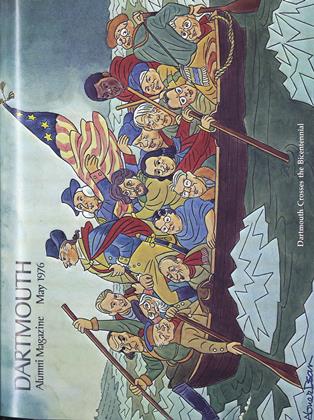EVAN X HYDE '68 is not an American, and perhaps that is why America's Bicentennial means so much to him. Hyde, who lost his political naivete and became an activist at Dartmouth during the tumult of the late 1960s, compares the struggle for independence of his country, Belize, with the struggle for independence undertaken by the American patriots two centuries ago.
Belize, formerly British Honduras, is a nation of 150,000 people who live in a Central American land the size of Massachusetts. Tourist brochures used to call it the "eighth continent." Belize is struggling for its existence against Guatemala, which has long claimed its territory. "Because of America's support for Guatemala," Hyde comments, "the political leaders of Belize have had to seek support for Belize's independence from the Third World, and Cuba has been vociferous in her support of our right to self-determination."
Hyde believes America, especially in the year when, he says, "you are remembering the courageous struggle of your ancestors," should re-evaluate its posture on this Central American issue. He says American support of the Guatemalan claims is forcing Belize into Cuba's arms and adds, "If the people of the United States only knew the true story, I know they would support our people's right to self-determination."
The United States could achieve its foreign policy goals in the Belize-Guatemala conflict, Hyde insists, simply by telling Guatemala to "lay off, let us go independent, and there will be no communism in Belize." Hyde says the citizens of his country are neither racists nor communists and that the United States is supporting Guatemala's claims "because of big business interests there."
The son of the Postmaster General, Hyde was educated in Catholic schools in Belize City and received a U. S. State Department scholarship to attend Dartmouth. He graduated summa cum laude with a degree in English before returning home and forming a black nationalist group known as UBAD. Arrested four times in as many years, Hyde managed to spend only one night in prison. He taught English in a Methodist high school in Belize City and later began Amandala, a newspaper he still publishes. He disbanded ÜBAD after a defeat in elections in the autumn of 1974 and became what he calls a "fulltime newspaper publisher or capitalist." With Amandala, he says, "I provide employment, take care of my kids, and stay out of trouble."
Most of his UBAD supporters have migrated to the United States for work or have joined a local Muslim temple. Hyde, though not a Muslim, supports their work, which he calls "a stable and successful program." He counts Muhammad Ali among his heroes and says that "what the American government did to Ali is somewhat similar to the Belize government's persecution of UBAD."
Hyde first attracted American attention when an article in Time quoted him as saying, "The white man is your enemy and don't you forget it. Tourism is whorism. I say live black. Black and proud." Hyde says Time "really did a job of making me out to be some kind of maniac," and he denies making the statement. Today he is a businessman and believes that if "controlled tourism can help the economy of my country, I'm all for it."
He looks to the future with guarded optimism — that is, he remarks, if "the good people of America can only be informed as to our righteous struggle for independence." But he no longer seems to be the activist he once was. "In future years," Hyde says, "some young brother may take up where I left off." He is grateful for having survived: "The fate of the average black power leader was death, jail, or ignominy. Mine was a somewhat cynical resignation to prevailing hypocrisy."
Evan X Hyde '68 and his followersseek a free and independent Belize.
 View Full Issue
View Full Issue
More From This Issue
-
 Feature
FeatureSelf-Evident Truths
May 1976 By ARTHUR M. WILSON -
 Feature
FeatureReading and Writing History and Revolutionary Footnote
May 1976 By PAGE SMITH -
 Feature
FeatureWhen Dartmouth Had Its Own State (Almost)
May 1976 By JAMES L. FARLEY -
 Feature
FeatureThanks to Daniel Oliver, A Gathering of Lovers
May 1976 By DAN NELSON '75 -
 Article
ArticleThe Green: A House Mover and an ex-President Proved Who Owns It (Didn't They?)
May 1976 By Jabberwocky, Lewis Carroll, JAMES L. FARLEY '42 -
 Class Notes
Class Notes1923
May 1976 By WALTER C. DODGE, CHARLES J. ZIMMERMAN
D.M.S.
-
 Article
ArticleFresh Man in Washington
November 1975 By D.M.S. -
 Article
ArticleWe're All Right, Jack
December 1975 By D.M.S. -
 Article
ArticleBasement Admiral
December 1975 By D.M.S. -
 Article
ArticleRescuing an Elephant on Wheels
March 1976 By D.M.S. -
 Article
ArticlePolitics Grow Greener
May 1976 By D.M.S. -
 Article
ArticleThe Seniors Writ Large: Some Sit Right, Some Don't
June 1976 By D.M.S.
Article
-
 Article
ArticlePearson Again Honored
February, 1931 -
 Article
ArticleMencken Collection
November 1938 -
 Article
ArticleMover Extraordinary
August 1942 -
 Article
ArticleCREW
MAY 1968 By ALBERT C. JONES '66 -
 Article
ArticleEDWIN J. BARTLETT: AN APPRECIATION
October 1932 By Charles E. Bolser -
 Article
ArticleWhen Doctors Disagree
November 1945 By P. S. M.

